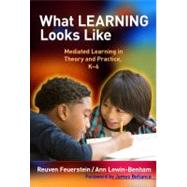
Note: Supplemental materials are not guaranteed with Rental or Used book purchases.
Purchase Benefits
What is included with this book?
| Foreword | p. xi |
| Acknowledgments | p. xv |
| Introduction | p. 1 |
| Mediation: A Brief Description and Examples | p. 1 |
| A Word About Deficient Cognitive Functions | p. 2 |
| Reading This Book | p. 3 |
| Chapter Summaries | p. 4 |
| Knowing Your Authors | p. 5 |
| Learning Through Mediation | p. 9 |
| Museums' Potential to Stimulate Learning | p. 11 |
| At a Museum: What Didn't Happen, Why, and Changing It | p. 14 |
| Recognizing Myths About Learning | p. 21 |
| The Mediated Learning Experience Defined | p. 26 |
| Feuerstein: Mediator and Theorist | p. 26 |
| Theory of Mediation | p. 30 |
| The Three Partners of Mediation | p. 33 |
| Essential Aspects of Mediation | p. 38 |
| Summary: A Picture of Mediation | p. 42 |
| Mediated Learning in Action | p. 44 |
| The FIE Programs: An Overview | p. 44 |
| FIE Lessons by Mediators | p. 53 |
| Summary: Imaginative, Authoritative, and Responsive Teaching | p. 58 |
| Expert Mediators | p. 59 |
| Mediation in Two Classrooms | p. 60 |
| Mediation in an Exhibit | p. 66 |
| Summary | p. 69 |
| Four Essential Cognitive Acts | p. 71 |
| Acquiring Basic Competencies | p. 71 |
| Intersection of Basic Competencies | p. 76 |
| Summary: Mediation-The Connecting Link to Learning | p. 85 |
| Defining the Effectiveness of Learning Experiences | p. 87 |
| The Cognitive Map | p. 87 |
| The Thinking Deficiencies Tool | p. 97 |
| Two Techniques to Enhance Learning | p. 98 |
| The Case for Mediation: Demetria's Story | p. 101 |
| Summary: Analytic Observation Tools | p. 102 |
| Creative Use of Effective Exhibits | p. 103 |
| Learning from Rich Experiences | p. 103 |
| Providing Conflict-Producing Ideas | p. 111 |
| Appealing to Multiple Intelligences | p. 114 |
| Summary: Mediating Exhibits | p. 117 |
| More Essential Cognitive Acts | p. 118 |
| Empathy | p. 118 |
| Acquiring New Skills | p. 121 |
| Mastering Varied Modalities | p. 122 |
| Collaborating | p. 126 |
| Complex Thinking Acts | p. 129 |
| Museums' Abundant Experiences | p. 131 |
| Summary: Mediating for Complexity | p. 132 |
| Blue Sky Partnerships | p. 133 |
| Beliefs About Learning | p. 133 |
| Adult Interventions | p. 138 |
| Museums as Partners | p. 140 |
| "What If Ideas | p. 143 |
| Emily's Story: Mother as Mediator | p. 147 |
| Summary: Museums as Learning Centers | p. 148 |
| Enlarging the Cognitive Repertoire | p. 149 |
| Incongruence | p. 153 |
| Repetition | p. 153 |
| Transformation | p. 158 |
| Illusion | p. 164 |
| Stereognostic (Hand/Vision) Experiencees | p. 166 |
| Summary: Challenging Designs | p. 168 |
| Stretching the Brain to Make Learning Happen | p. 170 |
| Motivation | p. 170 |
| Summary: Four Interrelated Factors in Learning | p. 177 |
| Moving from Concrete to Abstract Thinking | p. 177 |
| The Brain and Learning | p. 182 |
| Summary: When We Think and Learn | p. 185 |
| After Words | p. 189 |
| For Teachers | p. 189 |
| Questions to Ask of Exhibits | p. 194 |
| Summary Prepare, Question, Discuss | p. 198 |
| Understanding Exhibit Design | p. 198 |
| Summary: Bringing Learning Home | p. 201 |
| List of Deficient Cognitive Functions | p. 203 |
| Children with Learning Challenges: Notes for Parents and Exhibit Designers | p. 205 |
| References | p. 207 |
| Index | p. 213 |
| About the Authors | p. 219 |
| Table of Contents provided by Ingram. All Rights Reserved. |
The New copy of this book will include any supplemental materials advertised. Please check the title of the book to determine if it should include any access cards, study guides, lab manuals, CDs, etc.
The Used, Rental and eBook copies of this book are not guaranteed to include any supplemental materials. Typically, only the book itself is included. This is true even if the title states it includes any access cards, study guides, lab manuals, CDs, etc.